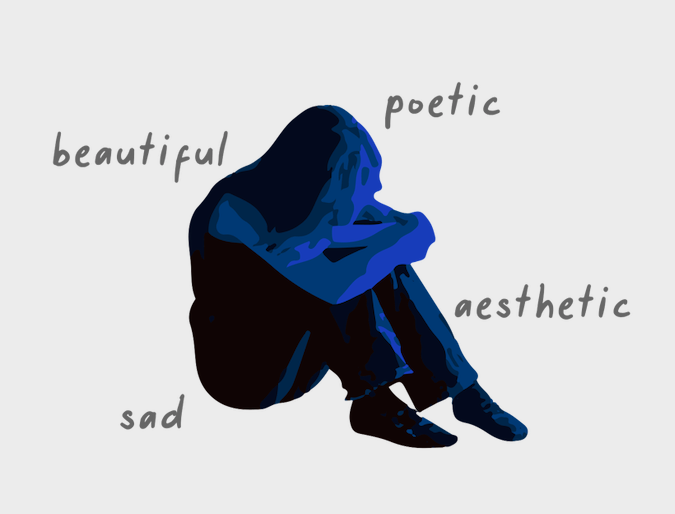This article contains potentially sensitive material concerning mental illness and suicide.
Depiction of mental illnesses in media has long been problematic. In older movies and shows, mental illness was commonly associated with violence and insanity. Horror films like Halloween, Silence of the Lambs and Psycho cited mental disorders as motives behind the featured homicidal maniacs. This stereotype created harmful stigma surrounding illness that alienated real people who were struggling and discouraged them from asking for help.
As media evolved, mental health depictions remained just as inaccurate, but shifted from stigmatization to romanticization. Modern movies and TV shows often glamorize mental health problems, portraying characters with mental health as “tragically beautiful” and implying their value comes from or is amplified by their diagnosis. Rather than a life-threatening struggle, mental illness becomes a quirk to set a character apart.
“Trying to present mental illness in a way that reduces stigma is certainly something that we need,” AP Psychology teacher Donna Walker said. “For too long, people with mental illnesses have been portrayed as psychopaths or serial killers or criminals. There’s something to be said for presenting the mental illness in a way that’s informative, educational and in a way that reduces stigma. But I definitely do see instances where it seems to be glamorized.”
Netflix’s hit coming-of-age series 13 Reasons Why, based on the book of the same name, is the most popular example of this trend. Main character Hannah Baker has a romanticized kind of depression, speaking about her sadness in poetry that sounds Shakespearean. Rather than being seen as an illness, her depression gives her a more in-depth understanding of life, evident by her philosophical remarks throughout the series. The show also glorifies her suicide as a method of revenge, which was hailed as problematic by hundreds of critics after the show’s release, especially since the show was primarily geared towards teenagers.
If approached correctly, displaying mental health issues in media can destroy harmful stigmas and create open dialogue about mental health issues. However, inaccurate representations are detrimental not only to people with mental illnesses, but to society as a whole.
When media idealizes mental illness to the point that it’s glamorous, impressionable audiences such as teenagers begin to associate attractiveness or emotional depth with being mentally ill. This leads to promoting unhealthy behaviors on social media in order to fit the inaccurate “mental illness aesthetic” that is being spread.
A quick search into Pinterest or Tumblr of “depression aesthetic” yields hundreds of poetic quotes about sadness and background images of picturesque nature scenes or roses wilted. These romanticized views floating around the internet cause many to equate beauty with depression and desire to be tragically beautiful, even at the detriment of their mental health.
As social media becomes a primary platform for finding information, it becomes increasingly obvious that there is no separation between facts and fiction on the internet. Many teens assume what they find online must be true, including the skewed perception of mental illness. This misinformation also affects those trying to access resources for healing, because the aesthetic being promoted online depreciates the idea of being mentally healthy.
“[Mental illness] becomes something that makes a person more complex rather than a struggle,” junior Ainsley Tishler said. “And when people feel lost, and they’re searching for that validation that people find online with mental illness, it can lead them to view struggle as something that’s deserved and something that makes them a more desirable person.”
When a movie or show intentionally dramatizes or minimizes mental illness in order to gain entertainment value, it sends a message to viewers that the unrealistic version of mental illness they’re portraying is accurate. This leads to widespread misconceptions such as depression is poetic or that people with anxiety just need to relax and they’ll be cured.
“Things like depression are very easy to romanticize on screen and on social media, until you meet someone in real life who hasn’t showered in days or hasn’t brushed their teeth in months,” Tischler said. “[Media] neglects to show the gross or non-aesthetical parts of mental illness.”
Society as a whole needs to evaluate the lens with which it views mental illness, and find a way to raise awareness about the issue without romanticizing or falsely portraying it. Mental illness is not a quirk. It is not intelligent or poetic or tragically beautiful. It is an illness that should be taken seriously.
“Don’t minimize what can be a truly debilitating and destructive illness,” Walker said.











